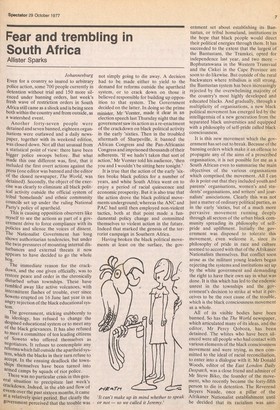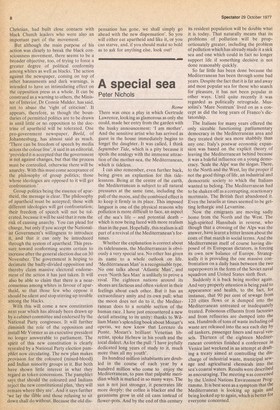Fear and trembling in South Africa
Allister Sparks
Johannesburg Even for a country. so inured to arbitrary police action, some 700 people currently in detention without trial and 150 more silenced under banning orders, last week's fresh wave of restriction orders in South Africa still came as a shock and is being seen both within the country and from outside, as a watershed event.
Another forty-seven people were detained and seven banned, eighteen organisations were outlawed and a daily newsPaper, together with its weekend edition, was closed down. Not all that unusual from a statistical point of view: there have been bigger police swoops before. But what made this one different was, first, that it included the first overt actions against the press (one editor was banned and the editor of the closed newspaper, The World, was detained). Secondly, the object of the exercise was clearly to eliminate all black political activity outside the official system of tribal 'homelands' and ethnic community councils set up under the ruling National Party's policy of apartheid. This is causing opposition observers like myself to see the actions as part of a government drive to force compliance with its Policies and silence the voices of dissent. The Nationalist Government has long shown authoritarian tendencies, but under the twin pressures of mounting internal disturbances and external threats it now appears to have decided to go the whole hog.
The immediate reason for the crackdown, and the one given officially, was to restore peace and order in the chronically disturbed urban townships. These have rumbled away like active volcanoes, with intermittent flashes of trouble, ever since Soweto erupted on 16 June last year in an angry rejection of the black educational sys tem.
The government, sticking stubbornly to its ideology, has refused to change the despised educational system or to meet any of the black grievances. It has also refused to meet a committee of ten leading citizens of Soweto who offered themselves as negotiators. It refuses to contemplate any reforms which fall outside the apartheid system, which the blacks in their turn refuse to accept. In the ensuing deadlock the townships themselves have been turned into armed camps by squads of riot police. There was no particular crisis in this general situation to precipitate last week's crackdown. Indeed, in the ebb and flow of events over the past sixteen months, it came at a relatively quiet period. But clearly the government perceived that the trouble was not simply going to die away. A decision had to be, made either to yield to the demand for reforms outside the apartheid system, or to crack down on those it believed responsible for building up opposition to that system. The Government decided on the latter. In doing so the prime minister, Mr "Vorster, made it clear in an election speech last Thursday night that the government saw its action as a re-enactment of the crackdown on black political activity in the early 'sixties. Then in the troubled aftermath of Sharpeville, it banned the African Congress and the Pan-Africanist Congress and imprisoned thousands of their adherents. 'If we hadn't taken that sort of action,' Mr Vorster told his audience, 'then you and I wouldn't be sitting here tonight.'
It is true that the action of the early 'sixties broke black politics for a number of years, and white South Africa went on to enjoy a period of racial quiescence and economic prosperity. But it is also true that the action drove the black political movements underground; whereas the ANC and PAC had until then employed non-violent tactics, both at that point made a fundamental policy change and committed themselves to violent action in the future. Indeed that marked the genesis of the terrorist campaign in Southern Africa.
Having broken the black political movements at least on the surface, the gov ernment set about establishing its Bantustan, or tribal homeland, institutions in the hope that black people would direct their political energies through them. It has succeeded to the extent that the largest of' the Bantustans, the Transkei, opted for independence last year, and two more – Bophutatswana in the Western Transvaal and the Ciskei in the Cape Province are soon to do likewise. But outside of the rural backwaters where tribalism is still strong, the Bantustan system has been increasingly rejected by the overwhelming ,majority of the country's most highly developed and educated blacks. And gradually, through a multiplicity of organisations, a new black political movement has emerged led by the intelligentsia of a new generation from the separated black universities and equipped with a philosophy of self-pride called black consciousness.
It is this new movement which the government has set out to break. Because of the banning orders which make it an offence to propagate any of the aims of a proscribed organisation, it is not possible for me as a South African even to summarise the main objectives of the various organisations which comprised the movement. All 1 can do is point out that they included youth and parents' organisations, women's and students' organisations, and writers' and journalists' assOciations. Clearly this was not just a matter of ordinary political parties, as in the early 'sixties, but of a much more pervasive movement running deeply through all sectors of the urban black community spreading its philosophy of selfpride and upliftment. initially the government was disposed to tolerate this movement, even welcome it, since its philosophy of pride in race and culture seemed to accord with that of the Afrikaner Nationalists themselves. But conflict soon arose as the militant young leaders began rejecting the systems and institutions set up by the white government and demanding the right to have their own say in what was done. It is this which has led to the endemic unrest in the townships and the government's decision to strike at what it perceives to be the root cause of the trouble, which is the black consciousness movement• as a whole.
All of its visible bodies have been banned. So has the The World newspaper, which articulated many of its ideas, and the editor, Mr Percy Qoboza, , has been detained. The whites who have been silenced were all people who had contact with various elements of the black consciousness movement and were trying, as men committed to the ideal of racial reconciliation, to enter into a dialogue with it. Mr Donald Woods, editor of the East London Daily Despatch, was a close friend and admirer of Mr Steve Biko, the founder of the movement, who recently became the forty-fifth person to die in detention. The Reverend Beyers Naude, once a pillar of the Afrikaner Nationalist establishment until he decided that its racialism was anti Christian, had built close contacts with black Church leaders who were also an important part of the movement.
But although the main purpose of his action was clearly to break the black consciousness movement, there seems to be a broader objective, too, of trying to force a greater degree of political conformity among whites as well as blacks. The action against the newspaper, coming on top of other harassments and dark warnings, is intended to have an intimidating effect on the opposition press as a whole. It can be construed as a warning to others, the Minister of Interior, Dr Connie Mulder, has said, not to abuse the 'right of criticism'. It appears, therefore, as though the boundaries of permitted politics are to be drawn in until little or no opposition to the doctrine of apartheid will be tolerated. One pro-government newspaper, BeeId, of Johannesburg, has almost said as much. 'There can be freedom of speech by media across the colour line', it said in an editorial, 'provided it is accepted that the government is not against changes, but that the process must be controlled, otherwise there will be anarchy. With this must come acceptance of the philosophy of group politics; those whose ideologies are opposed to it will get confrontation.'
Group politics being the essence of apartheid, the message is clear. The philosophy of apartheid must be accepted; those with different ideologies will get confrontation; their freedom of speech will not be tolerated, because it will be said that it runs the risk of causing anarchy. You can plead for change, but only if you accept the Nationalist Government's willingness to introduce it, and that it can only be introduced through the system of apartheid. This pressure toward conforming seems certain to increase after the general election due on 30 November. The government is hoping to decimate the badly-divided opposition and thereby claim massive electoral endorsement of the action it has just taken. It will also be able to claim that there is a nearconsensus among whites in favour of apartheid, so that those few who oppose it should be silent and stop stirring up trouble among the blacks.
With this will come a new constitution next year which has already been drawn up by a cabinet committee and endorsed by the National Party congresses. It will further diminish the role of the opposition and install Mr Vorster as an executive president no longer answerable to parliament. The spirit of this new constitution is clearly revealed by a National Party election pamphlet now circulating. The new plan makes provision for the coloured (mixed-blood) and Indian minority groups in it. But both have shown little interest in what they regard as token concessions. The pamphlet says that should the coloured and Indians reject the new constitutional plan, 'they will remain where they are'. And it says further 'we lay the fable and those refusing to sit down shall do without. Because the old dis pensation has gone, we shall simply go ahead with the new dispensation'. So you will either eat apartheid and like it, or you can starve, and, if you should make so bold as to ask for anything else, look out!



































 Previous page
Previous page